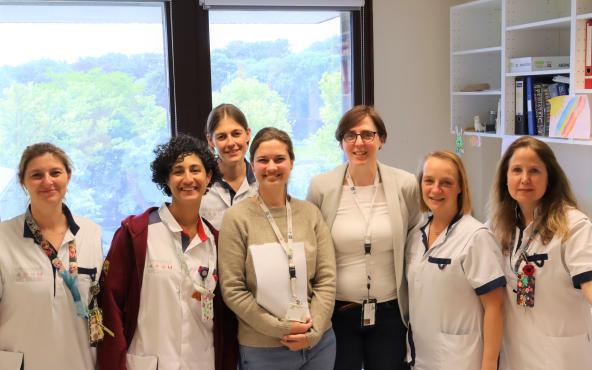We're hiring ! Join us and make a difference in our hospitals
Sickle Cell Disease.
Description
Sickle Cell Disease (or sickle cell anemia) is a hereditary genetic disorder characterized by an alteration of red blood cells. Red blood cells take on a sickle shape, reducing their ability to carry oxygen throughout the body. This can lead to pain crises, anemia, increased susceptibility to infections, and severe chronic complications. Sickle Cell Disease primarily affects individuals of African, Mediterranean, Middle Eastern, or Indian descent. A multidisciplinary approach allows for optimal management of acute events as well as chronic complications. Available treatments include hydroxyurea and blood transfusions. In some cases, hematopoietic stem cell transplantation may be considered.

The management of a sickle cell patient in the hospital is carried out by a multidisciplinary team, including pediatric hematologists, a specialized nurse, a psychosocial team, and other healthcare professionals (cardiologist, radiologist, biologist, ophthalmologist, etc.).
The support for sickle cell patients aims to educate them on recognizing and managing symptoms, preventing and detecting complications, and improving their quality of life. Regular follow-up and close communication between the patient, their family, and the medical team are essential for successful treatment.
Various treatment options are available, including:
-
Hydroxyurea: Currently, this is the only medication available in Belgium. It reduces the sickling of red blood cells, increases fetal hemoglobin production, and improves anemia. Clinically, this results in a reduction in vaso-occlusive events, decreased morbidity, and mortality. Promising new medications are currently undergoing clinical trials.
-
Transfusions: These are necessary in acute situations, such as severe anemia exacerbations or complications like a stroke or acute chest syndrome. Some patients may require a chronic transfusion program (or exchange transfusions) for stroke prevention.
-
Hematopoietic Stem Cell Transplantation: This is the only curative treatment currently available. Only patients with compatible donors are eligible for transplantation. It is a complex procedure that requires evaluating the individual benefits and risks.
Prevention measures include:
- Infection prevention through vaccination, prophylactic antibiotics, and prompt management of febrile events, significantly reducing mortality in young children.
- Early screening for patients at risk of stroke using transcranial Doppler, as well as monitoring for cardiovascular, pulmonary, and ophthalmological complications, ensuring prompt and appropriate care.
Psychosocial support is also available for sickle cell patients to help them cope with emotional and practical challenges associated with the disease.
Advices
Every child with sickle cell disease is unique, so it's essential to collaborate with the medical team to tailor care to your child's specific needs.
Please ensure that you attend all medical appointments, administer prescribed medications, and follow the doctor's instructions regarding follow-up and treatments.
Inform your circle of family and educators about sickle cell disease to promote understanding and inclusion.
Proper hydration is crucial at all times, especially during physical activity and in hot weather.
Reasons that should lead to an emergency visit to the hospital include:
- A fever (≥ 38.5°C).
- Pain that does not respond to Paracetamol/Ibuprofen.
- Severe weakness/fatigue, breathing difficulties.
- Loss of strength in a limb, difficulty speaking.
If you are planning a trip abroad, discuss it with your doctor, who will provide you with all the necessary advice to ensure a smooth journey.
Research
The Children's Hospital is equipped with experienced medical teams, including specialists in sickle cell disease (pediatric hematologists, a dedicated nurse, and other healthcare professionals trained in managing this condition).
Several clinical trials dedicated to sickle cell patients are ongoing at HUDERF and more broadly within the H.U.B. Some trials involve new medications like Crizanlizumab and Mitapivat, while others focus on gene therapy with the aim of providing a curative solution through genetic engineering.


